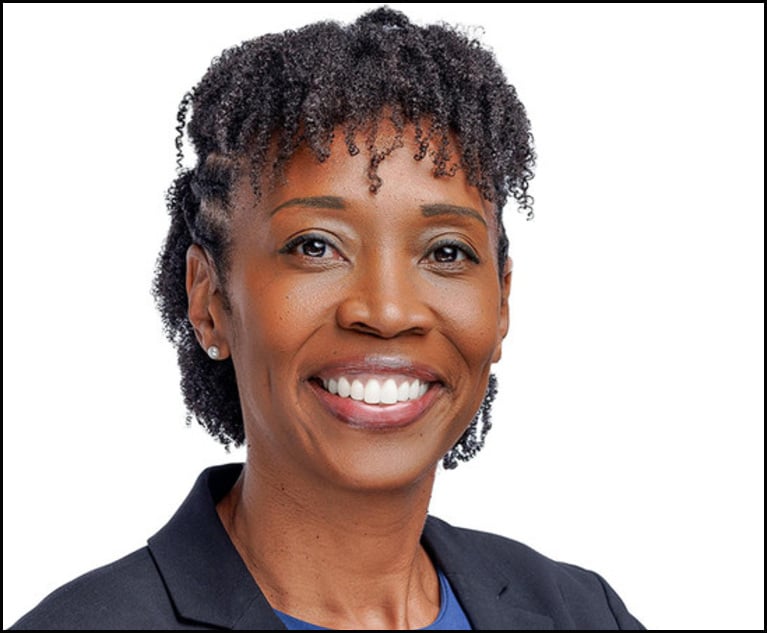Connecticut Joins Multi-State Suit Opposing Trump Medicaid Rule
As a result of the new rule, argue both Connecticut and the other states, the unionized workers would be harmed and, in the words of Connecticut, "undermined," as the infrastructure relied on by the unionized workers for union deductions is harmed.
May 15, 2019 at 06:08 PM
5 minute read
 Credit: Shutterstock.com
Credit: Shutterstock.com
Connecticut has joined a new multistate lawsuit aiming to stop implementation of a new Trump administration rule that Connecticut and several other states say would interfere with and in some ways undermine thousands of home care workers who assist the elderly and disabled through Medicaid programs.
The new “Final Rule,” issued by the Department of Health and Human Services on May 6, would effectively prevent long-established union deductions and benefit contributions made by Medicaid-based home care workers via direct payroll deductions, according to the multistate suit, which was filed Monday in U.S. District Court for the Northern District of California.
As a result, Connecticut and the other states argue, the unionized workers would be harmed and, in the words of Connecticut, “undermined,” as the infrastructure relied on by the unionized workers for union deductions is harmed.
And as a result, both Connecticut and the other states additionally contend, the vulnerable populations they serve may also suffer and lose out.
“The Trump Administration's final rule would not only deny homecare workers the right to fight for basic workplace rights, but it would jeopardize the health and well-being of the 15,000 Medicaid recipients who rely on this program for assistance,” said state Attorney General William Tong in a news release on Tuesday announcing that Connecticut had joined the suit.
And the 36-page federal complaint states at one point, “Finally, any changes to the States' Medicaid personal care services program that reduce the quality or stability of providers create real human costs for the beneficiaries of those programs.”
It then adds that “individuals who are aged, blind and disabled and need assistance to perform activities of daily living are better served by consistent and well-trained caregivers.”
Both Tong in the news release and the complaint do concede that there would be one way around the effects of the new rule, but say that it would not be tenable.
“While the States could, in theory, avoid risking this disruption by foregoing federal Medicaid funding for personal care services, doing so would forfeit more than $6.5 billion in federal dollars, causing devastating harm to state healthcare budgets and eroding the States' capacity to provide needed homecare for seniors and persons with disabilities,” the complaint says.
The Department of Health and Human Services on Wednesday declined to comment on the multistate lawsuit or Connecticut's role in it.
According to the suit, which is being led by California but has been joined by Connecticut, Massachusetts, Oregon and Washington, “each of the States has sought to improve the quality and stability of Medicaid homecare by extending state laws that authorize public-sector bargaining to the homecare workforce and permitting voluntary payroll deductions and/or benefit contributions.”
More specifically, as Tong explains about Connecticut in his news release, the state in 2012 enacted legislation creating the Personal Care Attendants Workforce Council, and it gave home personal care attendants the right to form labor organizations for collective bargaining with the state.
Moreover, Tong said, the majority of state home personal care attendants have joined the union and pay their dues through payroll deductions.
“Connecticut law specifically provides for deductions of union dues from the wages of personal care attendants pursuant to collective bargaining agreements, by a fiscal intermediary of the state,” he added.
But the new final rule from the health and human services department, he said, “interferes with the state's ability to deduct payments for worker benefits obtained through collective bargaining, like healthcare coverage or voluntary union dues, from homecare workers' paychecks.”
“This rule would disrupt well-established collective bargaining relationships authorized for decades by state labor laws,” Tong added.
The broader federal complaint, meanwhile, which seeks injunctive relief and a declaration that the new final rule is unconstitutional, argues that “if implemented in accordance with the Secretary's reinterpretation of the Medicaid Act, the Final Rule would undermine laws and agreements that have improved the provision of homecare to the States' residents,” and “it would disrupt well-established collective bargaining relationships and weaken an organized workforce infrastructure that the States have.”
“Historically, homecare workers have engaged in difficult, often physically-demanding work and faced low wages, few benefits, frequent injuries, and unpredictable hours, with no means to collectively address working conditions,” the complaint also points out, adding that “since States' authorization of collective bargaining, homecare workers have collectively chosen union representation.”
Then, in arguing against the Trump administration's rule implementation, the states say in the complaint that the “Final Rule … purports to reinterpret the Medicaid Act in a manner that would prohibit States from directly withholding these ordinary, voluntary deductions from homecare workers' paychecks.”
They then add that “defendants' purported basis for this rule change is a 47-year-old provision of the federal Medicaid Act, 42 U.S.C. Section 1396a(a)(32) … that prohibits assignment of rights to collect payment for Medicaid services to third parties,” but “Congress enacted that provision to prohibit a fraudulent medical financing scheme that bears no relationship whatsoever to legal payroll deductions such as union dues or other worker benefits.”
The suit names the Health and Human Services Department and its secretary, Alex M. Azar II, as defendants.
This content has been archived. It is available through our partners, LexisNexis® and Bloomberg Law.
To view this content, please continue to their sites.
Not a Lexis Subscriber?
Subscribe Now
Not a Bloomberg Law Subscriber?
Subscribe Now
NOT FOR REPRINT
© 2025 ALM Global, LLC, All Rights Reserved. Request academic re-use from www.copyright.com. All other uses, submit a request to [email protected]. For more information visit Asset & Logo Licensing.
You Might Like
View All



Trump's Inspectors General Purge Could Make Policy Changes Easier, Observers Say
Trending Stories
- 1Carol-Lisa Phillips to Rise to Broward Chief Judge as Jack Tuter Weighs Next Move
- 2Data Breaches in UK Legal Sector Surge, According to ICO Data
- 3Georgia Law Schools Seeing 24% More Applicants This Year
- 4After Shutting USAID, Trump Eyes Department of Education, CFPB
- 5‘Keep Men Out’: Female Swimmers Sue Ivy Leagues Over Lia Thomas’ Sweep
Who Got The Work
J. Brugh Lower of Gibbons has entered an appearance for industrial equipment supplier Devco Corporation in a pending trademark infringement lawsuit. The suit, accusing the defendant of selling knock-off Graco products, was filed Dec. 18 in New Jersey District Court by Rivkin Radler on behalf of Graco Inc. and Graco Minnesota. The case, assigned to U.S. District Judge Zahid N. Quraishi, is 3:24-cv-11294, Graco Inc. et al v. Devco Corporation.
Who Got The Work
Rebecca Maller-Stein and Kent A. Yalowitz of Arnold & Porter Kaye Scholer have entered their appearances for Hanaco Venture Capital and its executives, Lior Prosor and David Frankel, in a pending securities lawsuit. The action, filed on Dec. 24 in New York Southern District Court by Zell, Aron & Co. on behalf of Goldeneye Advisors, accuses the defendants of negligently and fraudulently managing the plaintiff's $1 million investment. The case, assigned to U.S. District Judge Vernon S. Broderick, is 1:24-cv-09918, Goldeneye Advisors, LLC v. Hanaco Venture Capital, Ltd. et al.
Who Got The Work
Attorneys from A&O Shearman has stepped in as defense counsel for Toronto-Dominion Bank and other defendants in a pending securities class action. The suit, filed Dec. 11 in New York Southern District Court by Bleichmar Fonti & Auld, accuses the defendants of concealing the bank's 'pervasive' deficiencies in regards to its compliance with the Bank Secrecy Act and the quality of its anti-money laundering controls. The case, assigned to U.S. District Judge Arun Subramanian, is 1:24-cv-09445, Gonzalez v. The Toronto-Dominion Bank et al.
Who Got The Work
Crown Castle International, a Pennsylvania company providing shared communications infrastructure, has turned to Luke D. Wolf of Gordon Rees Scully Mansukhani to fend off a pending breach-of-contract lawsuit. The court action, filed Nov. 25 in Michigan Eastern District Court by Hooper Hathaway PC on behalf of The Town Residences LLC, accuses Crown Castle of failing to transfer approximately $30,000 in utility payments from T-Mobile in breach of a roof-top lease and assignment agreement. The case, assigned to U.S. District Judge Susan K. Declercq, is 2:24-cv-13131, The Town Residences LLC v. T-Mobile US, Inc. et al.
Who Got The Work
Wilfred P. Coronato and Daniel M. Schwartz of McCarter & English have stepped in as defense counsel to Electrolux Home Products Inc. in a pending product liability lawsuit. The court action, filed Nov. 26 in New York Eastern District Court by Poulos Lopiccolo PC and Nagel Rice LLP on behalf of David Stern, alleges that the defendant's refrigerators’ drawers and shelving repeatedly break and fall apart within months after purchase. The case, assigned to U.S. District Judge Joan M. Azrack, is 2:24-cv-08204, Stern v. Electrolux Home Products, Inc.
Featured Firms
Law Offices of Gary Martin Hays & Associates, P.C.
(470) 294-1674
Law Offices of Mark E. Salomone
(857) 444-6468
Smith & Hassler
(713) 739-1250










